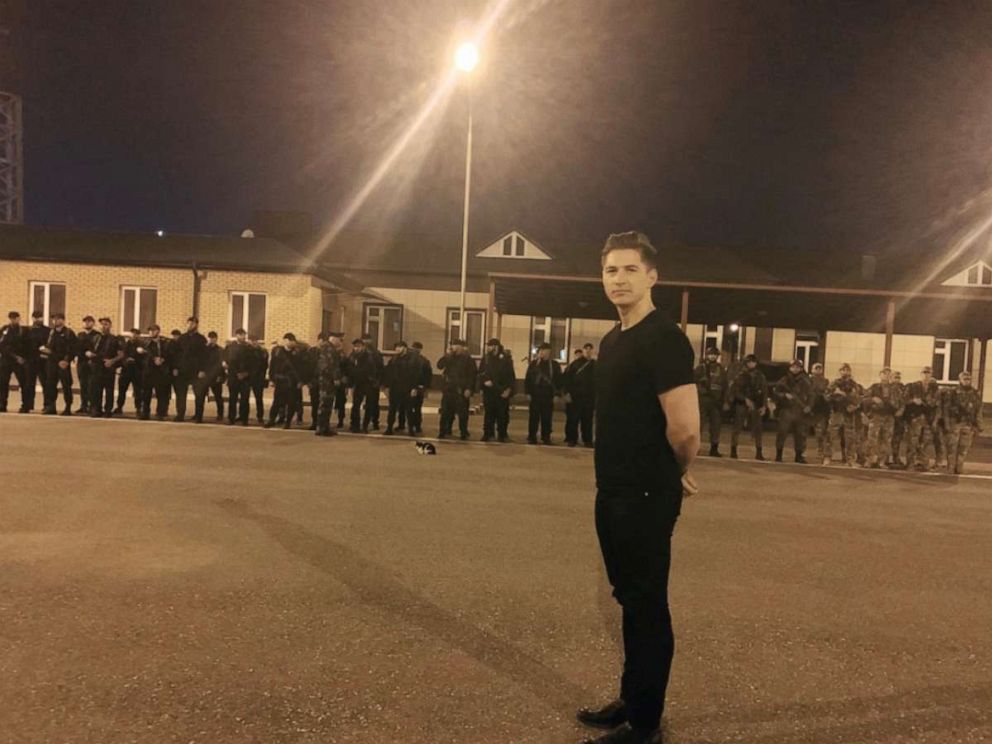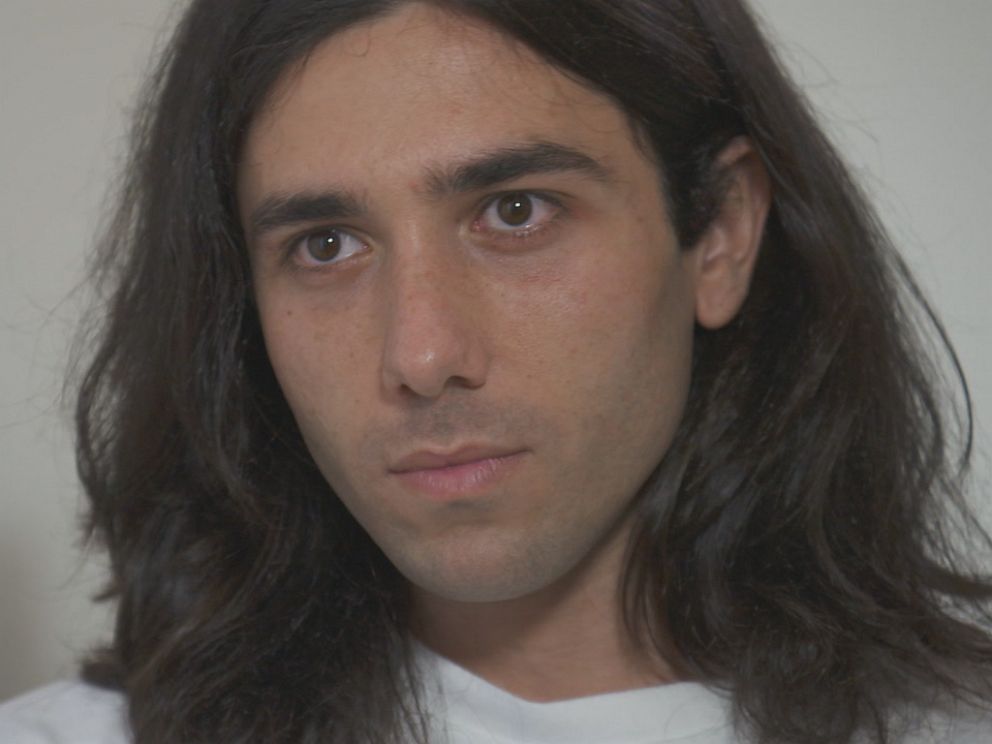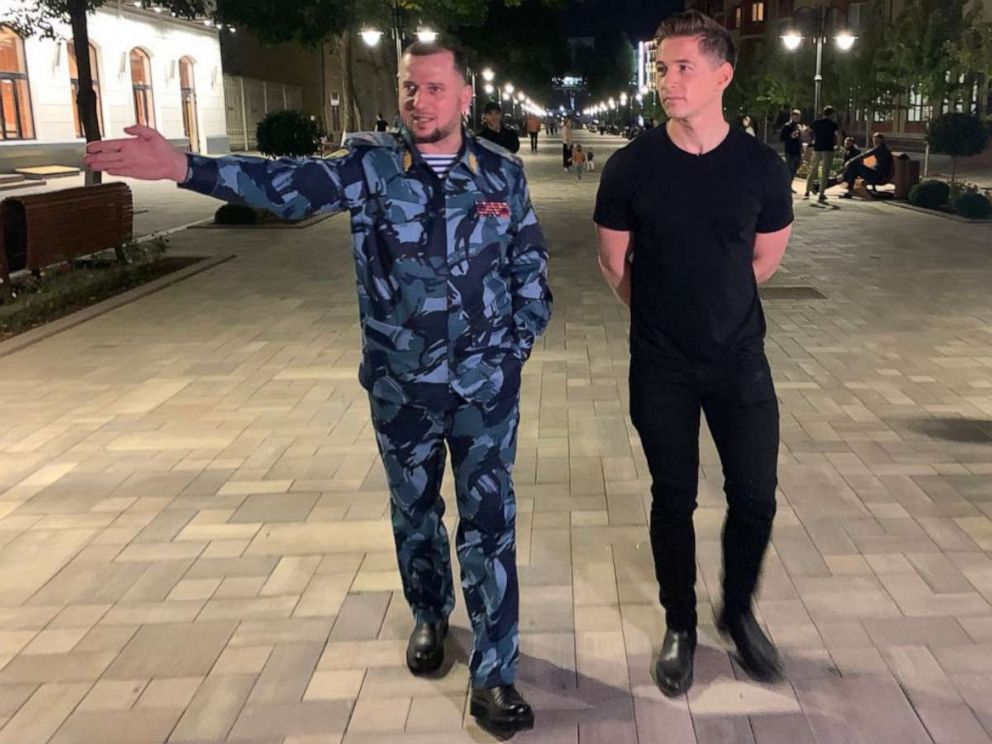Ricky was just 19 when he said the police came for him. He was at work and they took him to the local police station. From there he said they took him somewhere else, placing a bag over his head.
Interested in Pride Month?
“At first, they were just beating me. They punched me and then [they] used electric shock. They did waterboarding, which was the worst,” he said of his alleged torture in mid-2018.
The cause of Ricky’s detention, he said, was he had been filmed with two gay friends discussing LGBT issues. It took place in mid-July 2018.
In early 2017, the world became aware of reports that Chechen authorities were rounding up and torturing dozens of men they suspected of being gay, in what came to be known as a “gay purge.” Over 100 men were reported by rights groups to have been swept up by the security services and taken to police stations and secret prisons. From there, multiple accounts emerged describing beatings with plastic rods and electrocution. Rights groups have since reported several suspected deaths.
The international outcry to the alleged abuse of the LGBT community in Chechnya was huge — protests were held in cities around the world and European governments condemned the reports. The Trump administration imposed sanctions on top Chechen officials for their role in the persecution.
Three years later, however, little has changed and no one has been held accountable. Reporting by ABC News and others shows that while it hasn’t been on the same scale, the detention and torture of LGBT people in Chechnya never really stopped — and in many ways, it began earlier than 2017.
In January 2019, Russian LGBT activists reported a fresh wave of detentions, this time also involving gay women. Although far smaller than in 2017, this wave underlined a grim reality, that the so-called “purges” were in fact spikes in a routine practice in Chechnya– the regular arrest and torture of men suspected by police of being gay.
For almost a year, ABC News has recorded the stories of LGBT men and women persecuted in Chechnya and the surrounding region, or living in terror of exposure there. The names of most of those interviewed have been changed at their request out of fear the Chechen authorities or their families might harm them.
‘It’s a dictatorship’
Chechnya is a republic traumatized by violence. Located on Russia’s southern edge in the mountains of the North Caucasus, the area was devastated in two wars between the mid-1990s and later 2000s, Russian troops gutted Grozny, and hundreds of thousands were killed.
Since 2007, Chechnya has lived under the rule of Ramzan Kadyrov, a former rebel appointed by Russian President Vladimir Putin to crush his ex-comrades.
Kadyrov has remodelled Chechnya around himself, a cult of personality built around an obsessive machismo centered on sport, particularly martial arts.
In the majority-Muslim region, with a deeply conservative culture, being gay was never accepted. But under Kadyrov, the suffocating strictures defining Chechen identity have narrowed even further and are sometimes brutally enforced.
“It is a dictatorship. Everything is decided for you. Everyone should live the same way — have a family and be a good example,” said Harlem, a gay man who fled Chechnya after he said he was tortured in 2012 and now runs an NGO LGBT WorldBesides, which helps people leave the Caucasus.
The already deep-rooted homophobia of Chechen society in recent years appears at times to have converted into organized terror, part of a broader conservative campaign that has also targeted drug and alcohol users.
Amin Dzhabrailov, 27, only the second man to come forward publicly about his torture, told ABC News that armed police took him from the hair salon where he was working. For 14 days, he said, he was beaten and electrocuted, and then subjected to a mock execution.
“They put me on the wall, put bag on my head,” he remembered. “That guy charged his gun and put [it] right here, on my head. And I started painting the wall with my blood. And he said that it’s my last seconds.”
Almost all the people who have spoken to ABC News said the men who took them were members of Chechnya’s police. They described active attempts to hunt down gay men using informants and surveillance. They said the people who tortured them would demand they names other gay men.
‘For us, it’s crazy that someone among us might be gay’
Chechen authorities have dismissed the allegations as invented. Kadyrov and other officials have famously said there gay men don’t exist in Chechnya.
“For us it’s crazy that someone among us might be gay,” Apti Alaudinov, Chechnya’s deputy interior minister and commander of Chechen police forces, told ABC News in September.
“Ask any Chechen if there is a gay in his family, he will punch you in the face,” he said.
Aluadinov, who was sanctioned in 2013 by the United States for his alleged involvement in the kidnapping and torture of a Chechen politician, claimed the gay men alleging torture were simply seeking asylum in the West or that they themselves were likely not Chechens.
Despite their denials, Kadyrov’s inner circle have been accused of playing key roles in the 2017 “purge.” Magomed Daudov, Chechnya’s speaker of parliament, known by his nom de guerre, “Lord,” was alleged by Human Rights Watch to have “persuaded the Chechen leadership” to set it in motion.
When ABC reporters accidentally encountered Daudov in their hotel in Grozny, he dismissed the allegations and told said he was “proud” of the U.S. sanctions against him (he was sanctioned alongside Aluadinov for the torture of a the same politician).
‘I asked them to throw me out the window’
For LGBT people in Chechnya and the surrounding region, a double life is obligatory. Many men and women marry under pressure from their communities. Meanwhile, dating as an LGBT person in the Caucasus has potentially devastating consequences — and the threat of violence doesn’t always come from the state.
Ruslan, a bisexual man living in the neighboring republic of Dagestan, had a wife and a 1-year-old baby when he said his life was destroyed.
Five men lured him to an apartment where they beat him and forced him to admit he was gay on camera. The men demanded a few thousand dollars. When Ruslan couldn’t pay, they posted it on YouTube the next day.
“I asked them to throw me out the window. I asked them just to kill me. But no, they wanted money,” Ruslan said.
‘It’s harder for women because they can’t leave’
Many LGBT Chechens link the eruption of more systematic violence in the past few years to a worsening atmosphere of homophobia in Russia, signaled by the passing of the notorious so-called “anti-gay propaganda” law in 2013.
That law, which effectively banned public displays of homosexuality, has been criticized by rights groups as green-lighting discrimination and violence against LGBT people.
All over Russia, gay people reported increased hostility. But in Chechnya it seemed to encourage and may have later given cover to extreme violence by the security services.
Before 2016, there was still a tiny but still active underground gay scene in Chechnya.
Tabitha, a young woman who fled that year, told ABC News she would rent apartments in Chechnya to party in. She would gather groups to drive to clubs in nearby regions.
“From around 2009 till around 2014, there were clubs where lesbians could get together, dance, talk,” said Tabitha. “But they have closed now. In fact, all clubs have closed there, really.”
“People are afraid now,” she said. “The police have ears everywhere — in hotels, there are cameras, microphones,” she said.
For gay women in Chechnya, their romantic lives were mostly reduced to talking on online messenger services, she said.
“Men have more freedom, but they have more threats. It’s harder for women spiritually,” said Tabitha. “It’s harder for women because they can’t leave, they can’t go anywhere.”
‘I’m proud’
Despite the international outcry, Russia has mostly turned away criticism of the Chechen government. No high-level Russian official has ever condemned the reported detentions and Russian authorities have argued that it cannot investigate because the victims are anonymous.
But in late 2017, Maksim Lapunov came forward publicly describing how he was kidnapped off the street in Grozny and tortured. He filed the first and so far only criminal complaint over his torture.
Amid international pressure, Russia opened an investigation into Lapunov’s case. But after less than a year, a court in Lapunov’s hometown of Stavropol ordered it closed, citing lack of evidence. Lapunov, receiving death threats, fled for his life, and now lives in Europe where he has asylum.
The Russian investigation, as Lapunov’s lawyer and rights groups pointed out, ignored key information. In particular, Lapunov has said he had his phone on him, allowing him to prove that during his disappearance he had been in a building in the hear of Chechnya’s security district.
The detentions and torture, though occurring across Chechnya, have appeared to be more focused in some areas. The town of Argun, just outside Grozny, was repeatedly mentioned as an epicentre of the “purges”. Other police stations within Grozny have also been named by victims as key sites.
Still insecure here
Since the first “purge,” some Chechens have fled the region, helped most often by LGBT organizations.
The Russian LGBT Network, a St. Petersburg-based nongovernmental organization that provides safe houses in Russian cities, said it has helped over 150 people leave.
But fleeing Chechnya does not mean an automatic end to hardship. LGBT Network cannot provide people with shelter indefinitely and some who fear being kidnapped have said they are unable to receive asylum.
Some who had left told ABC News they felt they face a grim Catch-22 — they need asylum to avoid torture, but cannot prove it until they already have been.
Rights groups say there are mechanisms in place to prevent this situation for asylum seekers. But some men ABC News has met with have found themselves semi-homeless after fleeing to Moscow.
In Europe, the situation is also often not easy. In asylum centers, many of the residents are from conservative countries who are also intolerant of homosexuality.
Most frightening for some is the large Chechen diaspora in Europe.
Chechen refugees have described receiving threatening messages on the chat service Whatsapp from a group of men saying they have taken it on themselves to police behavior among Chechens abroad, including threats against asylum seekers for dressing inappropriately.
“We still feel insecure even here,” said Harlem.
Source: Read Full Article



